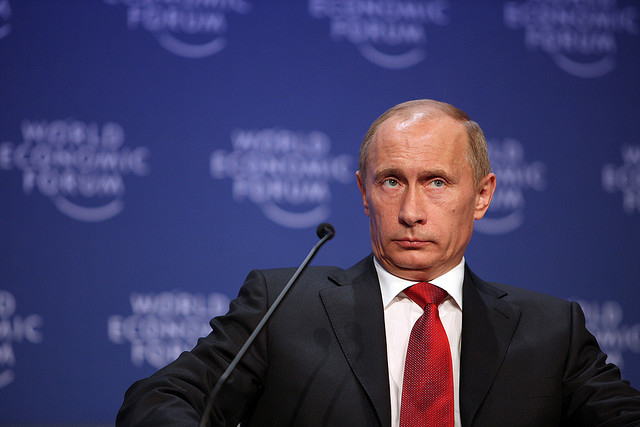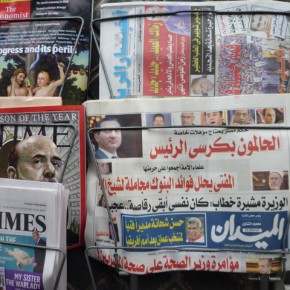The Russian economy faces crises on multiple fronts: currency devaluation, crashing energy prices, and Western sanctions. This is very bad news for Vladimir Putin, who has straddled the imbalances of post-Communist society for over fifteen years now. His only recourse has been to appeal to Soviet nostalgia and chauvinist nationalism in equal measure.
Market stabilization under Putin depended largely upon the long-term growth of the energy industry. Not just fossil fuels, such as oil and gas, but mineral resources as well. As economist Paul Mason has emphasized, the Russian strongman hoped that this would provide the basis for the reconstruction of the military, as well as long-term growth. The consequent stability would create a middle class filling in the vast gap between the poor, and the oligarchs.
For a long time, it looked as if Putin was delivering the stability craved by Russians after the rapacious debauchery and mayhem of the Yeltsin years. The days of hyperinflation were gone, and the meagre wages of workers could finally catch up to the price of goods. The middle class grew from 8 million to 55 million in just 6 years. The Russian government could get away with not redistributing the spoils amassed by the wealthy, as long as the standard of living for most Russians remained stable.
As Aleksandr Buzgalin has pointed out, the fundamental crisis is in the incapacity of the Russian market for self-regulation, and in the ineffectuality of state regulation. In theory, the largest sectors of the country’s economy were to be managed by public and private initiative, in order to advance profitability and national interests. In actuality, a corrupt and dysfunctional government is a good partner to corporations, who are not moral agents, and ‘national interests’ remain abstract.
Putin’s brand of national capitalism, not to be confused with a neoliberal market economy, faces the greatest challenges in its short history. Economic nationalism meant the combination of a flat tax regime, land privatisation, state management of resources and protectionist measures to maintain industry. Oil revenue allowed Russia to secure growth and pay off its Soviet-era debt. But the nationalist push against international capital inevitably comes up against the limits of its own barriers.
Russia has a strategic interest in keeping Ukraine out of the EU-NATO orbit, but this doesn’t mean it produces results for its economy. On the contrary, the invasion of Ukraine and annexation of Crimea led to diplomatic and economic pressures being brought against Russian institutions. The sanctions converged with the collapse of oil prices, as OPEC maintains output, confident that it will break even sooner rather than later. The rouble is unstable, sanctions are beginning to cripple international trade, and the economy is logically contracting.
The Russian government now fears Riyadh and Washington have set out to sink its economy with cheaper and cheaper oil, in particular. It’s not alone in this perception. “The only objective here that makes any sense to me, while I think it’s a destructive objective, there’s a logic to it,” as Paul Jay put it. “Putin had been calling on Russian oligarchs: ‘Bring your money back!’ He had been strengthening the public sector public ownership, the state- private partnerships. And if you can destroy that, you open up a whole field for foreign takeover.”
The encirclement of Russia by NATO outposts, US client states, and the European Union has pushed Moscow into embracing China. These ties will help prevent Russia from becoming totally isolated. Even before the Ukraine crisis set US-Russian relations ablaze Putin pushed to ‘de-offshore’ financial assets and investments. It may well be argued that the economic sanctions could engender political change, but they may very well perpetuate the trend towards economic nationalism.
In the midst of a currency crisis, Putin may move to impose controls on capital flows, and this may well put him at odds with the oligarchy. No wonder there has been speculation of a split in the business elite, which could threaten the long-term survival of his regime. However, Putin will be thinking of the 1998 financial crisis, which culminated in a run on the banks, eventually leading to a sea change in Russian politics. It became clear that the system was destabilised, and the power of the oligarchs would face a challenge.
Boris Berezovsky reached out to Putin as a candidate to succeed Yeltsin and prevent any serious corruption investigation from taking place. Berezovsky got his wish, and by the turn of the millennium, Yeltsin had resigned and Putin took on the mantle of Russia’s presidency. But then Putin turned on him and forced him into exile. This in itself demonstrates a willingness to confront the oligarchs, at least individually, in order to re-stabilise the system.
Capital controls may allow the Russian government to endure the fallout of the crisis, as the economy faces an estimated 5% contraction of growth in 2015, but it will also challenge the business class in its key strategy. The various offshore holdings of the Russian elites have allowed them to insulate themselves from the consequences of government policy. This may open all manner of difficulties in the long-term. However, it seems unlikely that Putin will face any immediate repercussions.
Putin has made clear in his public statements that he is not pursuing an isolationist policy – thus, closer ties with China – and that he will be shredding regulations on medium and small business to stimulate the economy. Meaning, he will not be looking to make fundamental changes. Instead, the Russian leader may tighten capital controls to further bind together the Russian state with the business class and keep the working class rallying around the flag. It’s hard to imagine such a strategy working, indefinitely.
As this article went to publication, the European Union leadership flirted with the idea of throwing Russia a lifeline, and relaxing its sanction regime. The reason? The West needs Putin’s cooperation in its ongoing War Against Terror, particularly in light of its failure to defeat ISIS. Undoubtedly, Russia’s price of restored cooperation would be a high one. But it might just be the only strategy the Russian leadership has at its disposal to survive.
Lead photo courtesy of the World Economic Forum. Published under a Creative Commons license.





